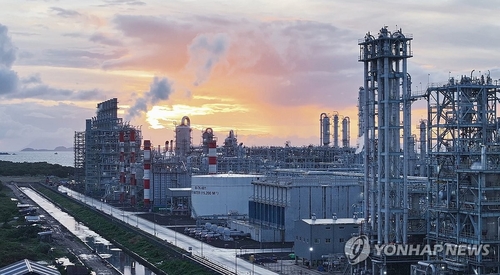(Seoul=Yonhap Infomax) Jae Heon Lee, Pil Joong Jeong – South Korea’s steel and petrochemical sectors, which have played a central role in the nation’s industrialization, continue to face mounting headwinds. As resource-poor industries, they rely heavily on imported raw materials, and the cost of securing dollars for these purchases has surged. With urgent investments needed for business restructuring and high value-added production, industry players are calling for greater exchange rate stability.
Steel and Petrochemicals: Dollar Positioning Becomes Critical Amid High Exchange Rates
According to Yonhap Infomax’s corporate bond maturity statistics (screen no. 4290) as of the 26th, LG Chem Ltd. held 3.0668 trillion won ($2.36 billion) in outstanding KP (foreign currency-denominated bonds) as of the previous day. Hanwha Solutions Corp. reported 886.9 billion won ($683 million) in KP bonds. Lotte Chemical Corp. disclosed in its Q3 report that it had 5.3937 trillion won ($4.16 billion) in short- and long-term foreign currency borrowings, while Kumho Petrochemical Co. listed 129 billion won ($99 million) in short-term foreign currency loans.
Such consistent foreign currency financing in the petrochemical sector is driven by the need to secure raw materials and fund various investments. The U.S. dollar, as the world’s reserve currency, is the primary settlement currency. A weaker won directly translates into higher manufacturing costs.
While aggressive exports or economies of scale could help offset the impact of a strong dollar, the current environment is challenging due to China’s supply glut, making it difficult to secure demand. For commoditized products with minimal technological differentiation, South Korean petrochemical firms are struggling to compete on price.
The steel industry faces similar challenges, relying on imports of iron ore and coking coal. POSCO, South Korea’s largest steelmaker, utilizes natural hedging by offsetting dollar payments with overseas sales from its global production bases. However, smaller steelmakers lack such options. The sector continues to grapple with low-priced Chinese competition and sluggish domestic demand.
Both steel and petrochemical industries find it difficult to benefit from high exchange rates through exports, as China’s oversupply keeps product prices depressed while raw material costs soar, squeezing margins.
Large-Scale Investments for High Value-Added Transition Raise Concerns
Steel and petrochemicals, often called the “rice of industry,” are in the midst of transitioning to higher value-added products, making the weak won even more painful. This shift is seen as essential for survival.
The steel sector is focusing on developing “super premium” products to meet the advanced needs of downstream industries such as automotive, shipbuilding, and home appliances. Strategies include high-efficiency electrical steel, low-carbon steel, and specialized heavy plates for offshore plants. The petrochemical sector is increasing its share of high-performance specialty materials.
Both industries are considering diverse investments, including overseas expansion and R&D, while also facing the challenge of business restructuring in cooperation with the government. The timing of planning and execution—the “golden time”—is critical.
Industry officials unanimously stress the importance of exchange rate stability, noting that investments could require multi-trillion-won funding. They emphasize the need for a predictable economic environment.
“Losses from a rising exchange rate are compounded by both higher raw material costs and increased foreign currency debt for overseas investments, making us highly sensitive to currency fluctuations,” said a petrochemical industry official.
“With global protectionism on the rise, it’s difficult to pass on exchange rate losses to product prices. While companies can strengthen hedging strategies and diversify import sources, excessive volatility leaves little time to prepare, leaving us exposed,” said a steel industry official.

jhlee2@yna.co.kr
joongjp@yna.co.kr
(End)
Copyright © Yonhap Infomax Unauthorized reproduction and redistribution prohibited.

